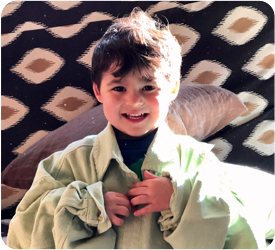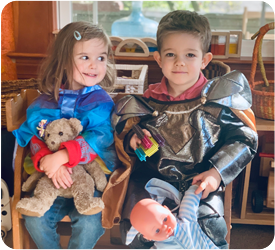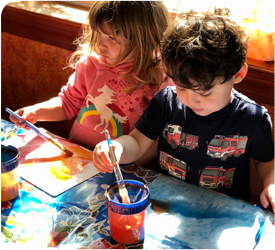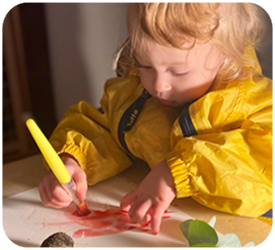

About Enrollment:
There are three main options that families tend to choose:
They use the scheduled breaks to either take vacations or plan visits with extended family.
They use the opportunity to connect with other kinship families and trade childcare.
They ask our teachers for their availability to offer childcare.
We follow Portland Public School district’s closure and late start policy. If there is inclement weather in the forecast, for the safety of all involved, we err on the side of caution when announcing late starts, early releases or full-day closures.
Every teacher that joins Sweet River Bamboo must be in current physical, mental and emotional health. They must have a current self-care practice and be in resonance with our program’s mission and core values. Additionally, all teachers must have at least two years of experience working with and caring for more than one child at one time. To ensure safety, all staff are fingerprinted and enrolled in the Central Background Registry, a database that continuously tracks people’s standing with the law. For more specific information about how are teachers are selected and trained, please refer to our About Us page.
Every program has been meticulously organized to ensure that all staff and children’s needs can be met during their time at SRB. Close relationships allow children and caregivers to flourish, and we support this by using a primary care model and as few transitions as possible during the first six years of life. In this way, children and caregivers have an opportunity to form secure attachments to each other.
Although we can not always predict or prevent mid-year teacher transitions, we believe that the relationships children have during the first few years of life are very important, therefore we take great care during teacher transitions for all involved. We are honored to be in the lives of children and view it as a privilege and a gift.

“There is nothing we can’t try.
We can do all these things
you see, whether
we are he OR she.”
~ Stan and Jan Berenstain,
He Bear She Bear

About our Philosophy:
Waldorf: We are drawn to Waldorf philosophy due to its emphasis on connection to one another and nature as well as the beauty and wonder it inspires. We have retained these elements of the wonder of childhood, magical and open-ended play opportunities, time spent outside, and opportunity for celebration. We have adopted this 100-year-old warm and feminine pedagogy within our program but maintain a critical lens to be more inclusive in regard to worldly cultures, gender fluidity, and the roles that masculine and feminine energies play in our current times. Unlike traditional Waldorf programs, we also draw on a greater variety of materials to gently offer introductions to literacy and numeracy, in various ways, as children show interest at their own pace.
Reggio: Reggio is emergent, project-based, child-led, and responsive to the collective group’s interests as a means of curriculum development. We value the child-led nature of Reggio but place this exploration and child-led learning in the context of primarily natural materials and themes that are simple and low in stimulation. In this way, we endeavor to foster the development of children’s connection to nature’s rhythms and to help remedy the media pervasiveness and nature deprivation faced by so many of today’s children.
Montessori: Montessori is brilliant in its approach to engaging the senses, preserving the purity of learning specific skills, and developing concentration and a sense of accomplishment while supporting independence and academic learning. Sweet River Bamboo offers children opportunities for engagement with Montessori materials and manipulatives, via rug-work focus activities, in balance with opportunities to explore creative and expressive open-ended play with loose parts at their own will. Teachers are always available for cuddles, engagement and co-regulation based on the individual needs of each child, to ensure secure attachments and meet the social-emotional needs of each child.
Childhood is not a preparatory time for any other stage of life. Childhood is the most important stage in human development which needs to be protected and respected for what it is, a time where foundational bodily functions, like brain development, are occurring around the clock. Digestion, wake/sleep rhythms and attachment styles are a few other processes that are developing during this stage. Contrary to modern living, these foundational human functions develop best in low tech and slow paced environments, with an emphasis on responsive caregiving to physical and social-emotional needs.
Childhood is also a time when foundational self-care skills and how to care for one’s own belongings and environment are learned. Being in community with people who model these practices organically though out the days, weeks and seasons with joy, facilitates this learning naturally. Focusing on academic learning or busying children with organized learning activities too soon greatly takes away the opportunity for these essential skills to develop holistically.
Empathy, defined, is the action of understanding, being aware of, being sensitive to, and vicariously experiencing the feelings, thoughts, and experience of another of either the past or present without having the feelings, thoughts, and experience fully communicated in an objectively explicit manner. (Merriam Webster)
Young children are naturally ego-centric and have a tendency to primarily think of their own needs and feelings and initially struggle with seeing any other perspective other than their own. Developing a sense of empathy is an integral part of social emotional learning for young children and benefits them well into adulthood. Empathy helps children build a sense of security and stronger relationships with other children and adults, which sets up a good foundation for learning. Empathy is a successful antidote and the preventative action to hate, segregation, discrimination and bullying by encouraging tolerance and acceptance of others. Empathy promotes social harmony and we need children to begin developing this as early as possible. As children develop empathy, they develop courage and bravery along the way, which in turn creates the building blocks to seek justice for others who have been hurt or wronged.
Humans, of all ages, need to be outside, preferably in a natural environment, every single day. Nature helps our bodies regulate and we have an ongoing relationship with it that needs tending to in order to stay healthy.
Here are a few reasons we spend as much time as we can outside:
- Being outside is regulating to our mind, body and spirit. Have you noticed how very highly active children calm down once they are outdoors or how very sleepy and tired children can get a second wind from being out in fresh air and engaging with the outside world? This experience is true for adults as well. Feelings of melancholy, anger and frustration tend to dissolve when the body has an opportunity to move intuitively throughout a natural space. Trees, offering calming green hues, and flowers offering colors, ranging the spectrum of a rainbow, give us assistance and opportunities to shift and regulate our moods.
- Outside time, and playing in the dirt, helps build the immune system by strengthening and diversifying our microbiome, a system critical to successfully fighting off disease.
- Exercise and risk taking: Children naturally gravitate towards using the areas of their body that needs to be challenged in order to develop. Spending unstructured time outdoors presents natural opportunities for children to explore safe risk taking and getting the physical exercise their bodies need.
- Executive Function: The skills that help us plan, prioritize, troubleshoot, negotiate, and multitask, all crucial for our success, can be developed through unstructured time outdoors spent alone or with a group of children. Relying on self entertainment, open-ended materials to use and other children to engage with all encourage children to develop their creativity and executive function skills by being responsible for organizing what they do with their time. Making up games with their own rules and trying to include everyone’s needs and preferences in the process also greatly assist children in developing their executive function skills.
- Socialization: In addition to the skill building opportunity unstructured play time lends to developing social skills with peers, spending time outside of a childcare setting, by going on neighborhood walks and visiting local parks, allows for socialization within the community. Neighborhood walks and outings also relieve feelings of isolation that caregivers can experience when caring for a group of young children on a regular basis. Spending time outside also allows for natural opportunities to engage with a variety of age groups, from children to elders, and helps strengthen our relationship to our immediate community.
- Appreciation for Nature: We ARE nature and being out in nature helps us remember this fact. Spending time in nature helps children learn about and understand the qualities of weather first hand and allows us to witness lifecycles of the plants, insects and animals we share a habitat with. Children can not respect or appreciate something they do not know or have a relationship with. In order for children to grasp the urgent necessity of treating our Earth with great care, love and protection, they must understand the endless beauty and abundance of gifts and nourishment this planet gives us first hand. When regular and ample time is spent outdoors the turning of the seasons becomes apparent by observing signs from animal behavior, the growth of flowers and the changing leaves of trees. By allowing children to spend time outside, year round, rain or shine, they discover how they need to adapt their play or explorations from season to season, which develops critical thinking skills and creativity. By bringing children’s attention to notice the difference in the quality of light and the scent in the air as the seasons change, children deepen their relationship with our Earth, their home.
Simply put, unstructured time for imaginative play creates out of the box thinkers and leaders. Imaginative play also develops children’s executive function abilities: The skills that help us plan, prioritize, troubleshoot, negotiate, and multitask, all crucial for our success, can be developed through unstructured time spent alone or with a group of children. Relying on self entertainment, open-ended materials and other children to engage with encourages children to develop their creativity and executive function skills by being responsible for organizing what they do with their time, making up games with their own rules and trying to include everyone’s needs and preferences in the process.
Children come into this world as whole beings with their own unique lens with which they view the world. Children also have an innate knowledge and wisdom that they naturally have access to from the very beginning. Giving children opportunities for unstructured open play time allows them to continue developing their relationship with their inner voice and the innate wisdom they carry.
No! Mixed-age classrooms offer opportunities to experience leadership and mastery of skills by teaching younger friends things they have learned themselves. Being part of a kinship with younger children offers organic opportunities to experience compassion, patience and care for others, the foundation for being a kind and productive member of society.
Our mixed-age classrooms also lend to the familial feel of our program by creating the feeling of being in the company of one’s siblings, brothers, and sisters.
We spent time visiting both public (PPS) and private kindergarten classrooms and consulting with kindergarten teachers to better understand what skills are needed during the preschool years to prepare children for kindergarten and first grade. The overwhelming response was that social-emotional skills and fine and gross motor skills are far more useful to children entering school than academic knowledge.
Kindergarten teachers went on to say that children who excel academically have several key skills: the social skills necessary for learning in a group setting, the ability to follow instructions, patience, empathy, impulse control, physical development, self-regulation and verbal self-expression. These skills, rather than academic knowledge, form the foundation for successful learning in school. The emphasis on non- academic skills provided by a play-based curriculum is, moreover, the developmentally appropriate approach to preschool education. This type of preparation results in a more holistic readiness for academic learning.
Both our Nurseries and Preschools are mixed-age play-based programs emphasizing secure attachment, a warm and loving atmosphere, and a prepared environment encouraging creative exploration, collaborative play and social-emotional development.

There is nothing we can’t try.
We can do all these things
you see, whether
we are he OR she.
~ Stan and Jan Berenstain,
He Bear She Bear

